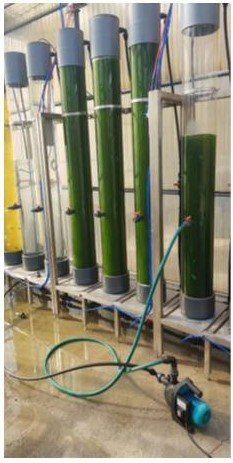
Microalgae are microscopic unicellular algae, typically found in freshwater and marine systems. They are considered as a viable source of protein and lipids, with nutritional yields higher than terrestrial crops. They are able to perform photosynthesis, producing approximately half of the oxygen present in the atmosphere and using the greenhouse gas carbon dioxide to grow photoautotrophically. Together with bacteria, they form the basis of the food chain, providing energy to all the upper trophic levels. The particularity of microalgae is their ability to adapt to several environmental conditions in response to environmental variability. Thanks to this peculiar characteristic modification of nutritional composition of microalgae can be reached by simply changing environmental factors used for their rearing.
Cultivation of microalgae is performed in bioreactor containing culture medium composed of commercial solid mixtures of micronutrients that include boron, copper, iron, manganese, molybdenum and zinc. The produced biomass is harvested daily by centrifugation of the rearing water.



